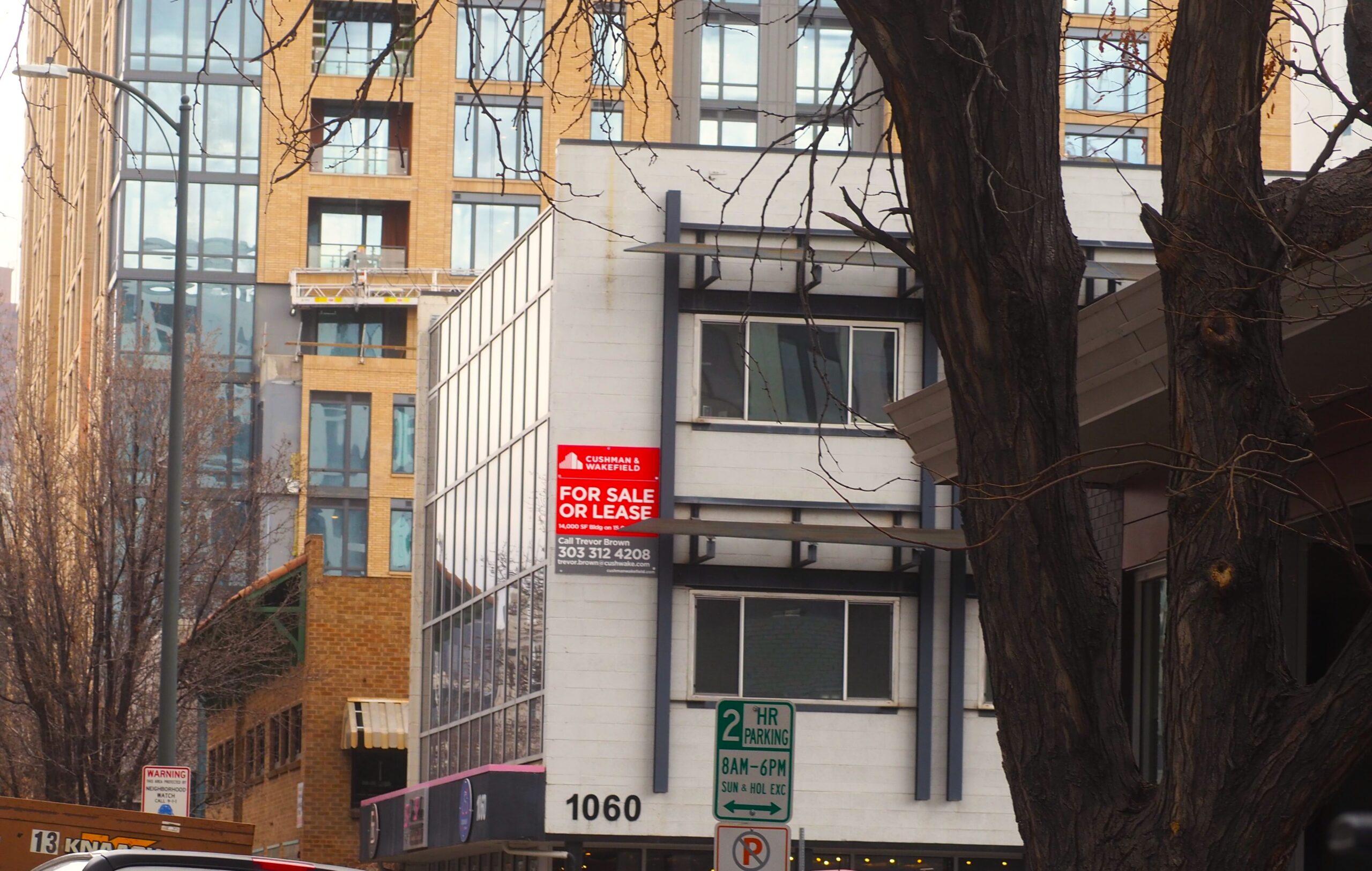
The 1060 Bannock St. was listed for sale for $3 million. (BusinessDen file)
A legal battle over a Golden Triangle property has ended in a sale.
The 13,000-square-foot office building at 1060 N. Bannock St. in Denver sold for $2.8 million on April 2, roughly three weeks after five co-owners of the building sued and then dropped the case against a sixth.
“The sale is the end result of a long arbitration process that started in 2021 and ended in receivership,” said Axio Commercial Real Estate owner John Livaditis, 50, who was the defendant in the lawsuit.

John Livaditis
The property was purchased for about $215 a square foot by the Dikeou family, which has numerous other holdings downtown and in adjacent neighborhoods. They did not respond to a request for comment on their plans for the space.
Livaditis, whose brokerage operates on the building’s third floor, purchased the property alongside five others in 2007 for $1.5 million. But the relationship between Livaditis and the other members of 1060 Bannock LLC fell apart in recent years — a fact that became public with the lawsuit last month.
“No matter how good a deal is, no matter how good you execute it, bad partners can destroy a deal,” Livaditis told BusinessDen last week.
James Sharpe is one of the other five. He’s operated a bike shop, TriBella, on the first floor of 1060 Bannock St. since 2011.
“The biggest victory lap that my partners are celebrating are that we no longer have to be in business with John Livaditis or Axio Real Estate anymore,” he said of the sale. “That’s what we’re celebrating.”
After buying and renovating the building, some of the members moved their various businesses into the space in 2008, as the Great Recession set in. Sharpe said the other five besides Livaditis were associated with the Denver-based firm MoDo Developers, which specialized in rehabbing tired apartments into condos. That business appears to no longer exist.
Livaditis said that most of the members “didn’t say a word” to him for most of the 2010s, only resurfacing around 2019 when they began to request financial information regarding the property.
“They saw value (in the building),” Livaditis said of his former business partners. “At the time when the thing was upside down and in debt … they checked out. I solved and unwound the problems. Once things were on good ground and what appeared to be millions of dollars in value, they cared.”
The partners ended up in arbitration. That process led to a receiver being appointed for the building, and directed to sell it.
“It was indecision that led to a receiver … we were unable to move forward as an LLC. In other words, nobody could agree on anything so that put the receiver in place,” Livaditis said.
Arbitration proceedings are private. But last month’s lawsuit filed by the other five building owners made some of the arbitration allegations public.
Livaditis, meanwhile, denied all the allegations and said the lawsuit was filed “to smear me.”
“They want to be petty,” he said.
Livaditis said he’d been managing the building by himself, and that his partners were “looking for problems” and misconstrued a number of transactions in an effort to conjure up instances of fraud.
“Every single thing in their second lawsuit was already part of the arbitration, and I was not found to have done anything that wasn’t just a clerical error,” he said.
“As an example: They accused Axio of not paying rent, when in reality, Axio was managing the building. The property management fee was the same as rent so we just didn’t exchange checks,” Livaditis said.
The plaintiffs in the suit – Sharpe, Todd McWhirter, Mike Hillegas, Dave Ness and Willie Pinkston – were represented by Denver attorney David Olson.
The lawsuit against Livaditis is no longer active. Sharpe and the four other partners dropped it just weeks after filing, before the building was sold.
Sharpe, 54, said his side initially wanted to litigate claims that hadn’t been settled by arbitration, along with some new allegations. But then they learned the building would be sold much sooner than expected and figured that the cost of a court battle wasn’t really worth it, although, “We stand by every one of those claims.”
“We just spent three years spending an obscene amount of money,” Sharpe said. “At the end of the day, you never know whether you’re going to be awarded attorney fees or not.”
“This will always be a he said — she said.”
Livaditis, meanwhile, thinks the quick dismissal is indicative of his innocence.
“The fact that they made the lawsuit and dropped it in a week tells you all you need to know … I take the allegations very seriously,” he said. “This is not how we (Axio) operate.”

The 1060 Bannock St. was listed for sale for $3 million. (BusinessDen file)
A legal battle over a Golden Triangle property has ended in a sale.
The 13,000-square-foot office building at 1060 N. Bannock St. in Denver sold for $2.8 million on April 2, roughly three weeks after five co-owners of the building sued and then dropped the case against a sixth.
“The sale is the end result of a long arbitration process that started in 2021 and ended in receivership,” said Axio Commercial Real Estate owner John Livaditis, 50, who was the defendant in the lawsuit.

John Livaditis
The property was purchased for about $215 a square foot by the Dikeou family, which has numerous other holdings downtown and in adjacent neighborhoods. They did not respond to a request for comment on their plans for the space.
Livaditis, whose brokerage operates on the building’s third floor, purchased the property alongside five others in 2007 for $1.5 million. But the relationship between Livaditis and the other members of 1060 Bannock LLC fell apart in recent years — a fact that became public with the lawsuit last month.
“No matter how good a deal is, no matter how good you execute it, bad partners can destroy a deal,” Livaditis told BusinessDen last week.
James Sharpe is one of the other five. He’s operated a bike shop, TriBella, on the first floor of 1060 Bannock St. since 2011.
“The biggest victory lap that my partners are celebrating are that we no longer have to be in business with John Livaditis or Axio Real Estate anymore,” he said of the sale. “That’s what we’re celebrating.”
After buying and renovating the building, some of the members moved their various businesses into the space in 2008, as the Great Recession set in. Sharpe said the other five besides Livaditis were associated with the Denver-based firm MoDo Developers, which specialized in rehabbing tired apartments into condos. That business appears to no longer exist.
Livaditis said that most of the members “didn’t say a word” to him for most of the 2010s, only resurfacing around 2019 when they began to request financial information regarding the property.
“They saw value (in the building),” Livaditis said of his former business partners. “At the time when the thing was upside down and in debt … they checked out. I solved and unwound the problems. Once things were on good ground and what appeared to be millions of dollars in value, they cared.”
The partners ended up in arbitration. That process led to a receiver being appointed for the building, and directed to sell it.
“It was indecision that led to a receiver … we were unable to move forward as an LLC. In other words, nobody could agree on anything so that put the receiver in place,” Livaditis said.
Arbitration proceedings are private. But last month’s lawsuit filed by the other five building owners made some of the arbitration allegations public.
Livaditis, meanwhile, denied all the allegations and said the lawsuit was filed “to smear me.”
“They want to be petty,” he said.
Livaditis said he’d been managing the building by himself, and that his partners were “looking for problems” and misconstrued a number of transactions in an effort to conjure up instances of fraud.
“Every single thing in their second lawsuit was already part of the arbitration, and I was not found to have done anything that wasn’t just a clerical error,” he said.
“As an example: They accused Axio of not paying rent, when in reality, Axio was managing the building. The property management fee was the same as rent so we just didn’t exchange checks,” Livaditis said.
The plaintiffs in the suit – Sharpe, Todd McWhirter, Mike Hillegas, Dave Ness and Willie Pinkston – were represented by Denver attorney David Olson.
The lawsuit against Livaditis is no longer active. Sharpe and the four other partners dropped it just weeks after filing, before the building was sold.
Sharpe, 54, said his side initially wanted to litigate claims that hadn’t been settled by arbitration, along with some new allegations. But then they learned the building would be sold much sooner than expected and figured that the cost of a court battle wasn’t really worth it, although, “We stand by every one of those claims.”
“We just spent three years spending an obscene amount of money,” Sharpe said. “At the end of the day, you never know whether you’re going to be awarded attorney fees or not.”
“This will always be a he said — she said.”
Livaditis, meanwhile, thinks the quick dismissal is indicative of his innocence.
“The fact that they made the lawsuit and dropped it in a week tells you all you need to know … I take the allegations very seriously,” he said. “This is not how we (Axio) operate.”
